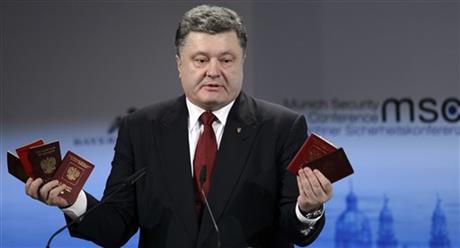
Ukraine’s president pushed Saturday for a quick cease-fire in his country’s troubled east, insisting that the conflict must be resolved and not “frozen,” and pressed Kiev’s case to be supplied with defensive weapons.
Petro Poroshenko spoke amid a hectic flurry of diplomacy. Hours earlier, German Chancellor Angela Merkel said she’s still unsure of reaching a deal to calm the crisis, which France’s president said could feature a broad demilitarized zone and greater autonomy for Ukraine’s separatist eastern region.
Merkel and French President Francois Hollande, fresh from trips to Kiev and Moscow, plan to discuss the proposals in a phone call Sunday with Russian President Vladimir Putin and Poroshenko.
The aim is to draw up a possible joint document on implementing the much-violated September peace plan concluded in Minsk, Belarus. That agreement also featured a demilitarized zone, though the battle lines have since changed, and the government in Kiev has offered a measure of autonomy to the separatists.
Poroshenko told the Munich Security Conference that Ukraine stands ready for a “comprehensive and immediate cease-fire” and Russia should be too.
He indicated he didn’t want any peacekeepers in eastern Ukraine, saying they wouldn’t be needed if foreign fighters were withdrawn and the Ukraine-Russia border sealed. Then, he said, there would be “peace and stability in Ukraine … within a couple of weeks.”
“There is no temporary solution — this conflict must be resolved, not frozen,” he said, alluding to long-time conflicts involving breakaway regions in Georgia and Moldova.
Hollande, speaking to France 2 television, said the plan under negotiation would see a 50- to 70-kilometer (31- to 44-mile) demilitarized zone.
He called for “rather strong” autonomy in the east. “These people have gone to war,” Hollande said. “It will be difficult to make them share a common life.”
Merkel said it is uncertain whether the talks will succeed, “but it is, from my point of view and that of the French president, in any case worth making this attempt.”
“This conflict cannot be resolved by military means,” Merkel said. “It is all the more important now to set out substantial steps that serve to fill with life the Minsk agreement.”
U.S. Vice President Joe Biden said that “it’s very much worth the attempt” but Russia must be judged by its actions on the ground, “not by the paper they signed.”
The urgent diplomacy comes as Western anxiety over the conflict grows and sanctions bite ever harder on Russia’s economy. More than 5,300 people have been killed since fighting began in April, according to a U.N. tally, and the bloodshed has markedly increased over the past two weeks.
Russia’s most immediate goal in the Ukraine crisis is likely the lifting of some of the Western sanctions which, in concert with plunging oil prices, have driven the Russian economy into a parlous state — or at least to fend off the imposition of further sanctions. In the longer game, Russia has pushed for so-called “federalization” of Ukraine that would give broad powers to its provinces and allow them to deal directly with Moscow.
Russia also wants to keep Ukraine out of NATO. Although Ukraine dropped its nonalignment policy last year, the Western alliance would be unlikely to accept Ukraine as a member in the near future because of its unstable politics and endemic corruption.
Merkel acknowledged disillusionment over the failure of previous agreements to stick and said “there are no theoretical guarantees” that a new one would either.
Russian Foreign Minister Sergey Lavrov said he “sincerely” hopes the latest diplomatic drive “will produce results, and those results will be supported by the parties to this conflict.”
As soon as Kiev and eastern Ukrainian separatists agree on practical details of implementing the Minsk deal, “I am sure that Russia will be among those parties that will guarantee the implementation of this agreement,” Lavrov told the conference. “But you can only guarantee what has already been achieved.”
The United States and other Western countries contend Russia has supplied troops and equipment to the separatists in eastern Ukraine who have been fighting Ukrainian government forces since April. Russia denies the claims.
The resurgent fighting has prompted the U.S. to consider giving lethal weapons to Ukraine, an option opposed by European nations which fear the move would merely make the situation worse.
“The problem is that I cannot imagine any situation in which improved equipment for the Ukrainian army leads to President Putin being so impressed that he believes he will lose militarily,” Merkel said. “I have to put it that bluntly.”
Poroshenko, who said talk of lethal weapons had been overdone and pointed to interest in equipment such as radar and jamming stations, arguing that “the lack of defense capability triggered offensive operations against Ukraine.”
Ukraine has “proven to be responsible, that we will not use the defensive equipment to the attack,” he said. “The stronger our defense, the more convincing is our diplomatic voice.”
Lavrov denounced “growing appeals in the West to … pump Ukraine full with lethal weapons and to involve it in NATO.” He said that “this position will only exacerbate the tragedy of Ukraine.”
Biden stopped short of explicitly addressing possible arms deliveries. “We will continue to provide Ukraine with security assistance not to encourage war, but to allow Ukraine to defend itself,” he said, adding that Washington doesn’t believe there is a military solution in Ukraine.
Meanwhile, fighting continued in eastern Ukraine. Five Ukrainian servicemen were killed and 26 wounded in fighting over the past day, Ukrainian security council spokesman Volodymyr Polyoviy said Saturday. The government website in the port city of Mariupol said one man was killed in shelling of the outlying settlement of Gnutove, which it blamed on rebels.
____
David Rising in Munich, Jim Heintz in Moscow and Lori Hinnant in Paris contributed to this report.



